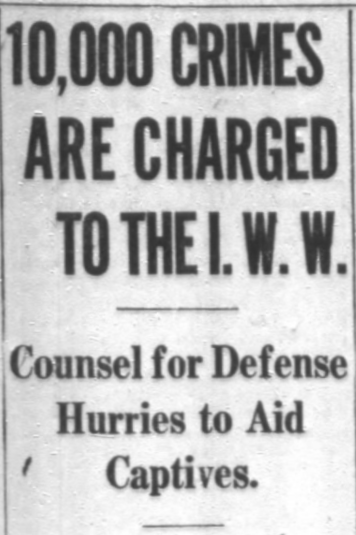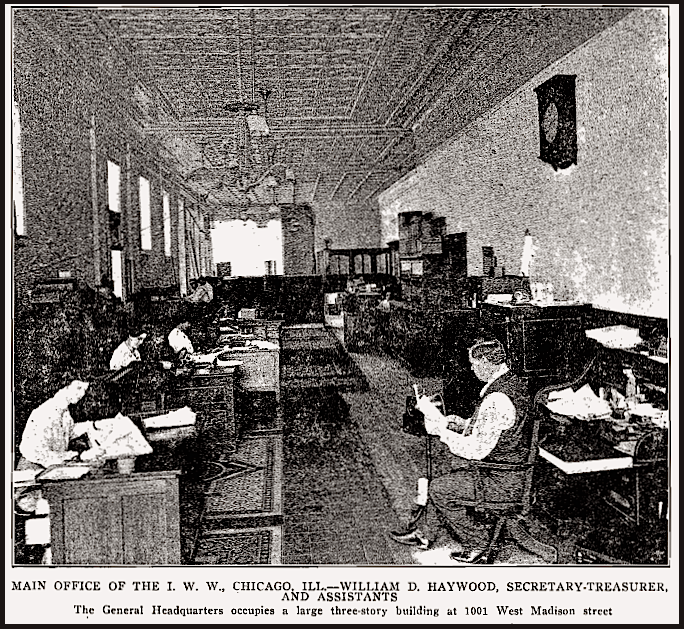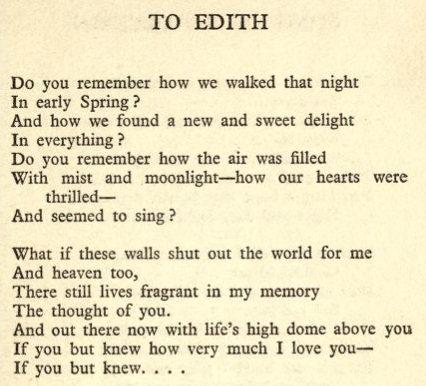Don’t worry, Fellow Worker,
all we’re going to need
from now on is guts.
-Frank Little
Hellraisers Journal, Monday October 1, 1917
Chicago, Illinois – “10,000 individual crimes are alleged.”
From The Chicago Sunday Tribune of September 30, 1917:
—–
—–
More than 10,000 individual crimes are alleged against members of the Industrial Workers of the World in a vast criminal campaign of sedition. This information was authoritatively given out from government sources yesterday.
It is declared that the conspiracy laid to the I. W. W. chiefs contemplated no less a general object than the hampering of eery objective of the government in its war aims. The allegation of 10,000 distinct crimes is said to grow out of discoveries of minor conspiracies within larger ones, like wheels within wheels, whereby each local branch of the I. W. W. would render itself sufficient unto the treasonable objects in its own particular territory.
[…..]
DEFENSE STARTS ACTION.
Upon the arrest of “Big Bill” Haywood, organizer, secretary, and treasurer of the international organization, and the members of his immediate “official family,” frantic preparations were made to institute defensive measures. Otto Christenson, attorney for the I. W. W., applied to District Attorney Clyne for a list of those arrested with the plea that he wished to appear for them. This was at first denied, but later given out.
Mr. Christenson explained that he would be assisted by Attorney F. A. Van Derverr [George F. Vanderveer] of Seattle, Wash., who now is on the way to Chicago…
[…..]
Bonds Are Sought.
Haywood still is held under bonds of $25,000 and the others on bonds equally heavy, according to their importance in the I. W. W. scheme of things. Attorney Christenson announced he would immediately set about obtaining sureties for the release of all those under arrest.
[Christenson stated:]
The I. W. W. members are guiltless of unpatriotic actions. The organization was started ten years ago, for economic purposes. Its functions are no different now than they were in peace times. The I. W. W. is not a war or an anti-war organization. It is not a religious or an anti-religious organization. It is only concerned in the welfare of its members.
The growing strength of the I. W. W. in certain industries of this country and the activity of its members to better their working conditions has earned the enmity of certain gigantic business interests, who have stopped at nothing in attempting to crush the I. W. W. organization.
[…..]
———-
[Photograph of I. W. W. Headquarters added.]
The Chicago Sunday Tribune
(Chicago, Illinois)
-Sept 30, 1917
(Also source for image of headline.)
https://www.newspapers.com/image/28775659/
https://www.newspapers.com/image/28775673/
IMAGES
IWW Chg HQ w BBH, ISR Oct 1917
https://archive.org/stream/ISR-volume18#page/n106/mode/1up
Ralph Chaplin, Bars and Shadows, to Edith
https://archive.org/stream/barsshadows00chaprich#page/42/mode/2up
See also:
Wobbly
Rough-and-Tumble Story of an American Radical
-by Ralph Chaplin
University of Chicago Press, 1948
https://books.google.com/books/about/Wobbly.html?id=n-ygPQAACAAJ
Note: Copyright not renewed per this source.
https://www.marxists.org/history/usa/unions/iww/1921/0102-chaplin-cominternandiwwbail.pdf
On pages 226-229, Chaplin describes the day of his arrest (Sept 28, 1917):
[After the Sept 5th raid on IWW HQ] Edith and I discussed the danger of the situation at length. She had known all along, better than any of us, what our activities were leading to. She had never reproached me. She didn’t reproach me now. She said, “I am frightened to death. It’s like a nightmare. You haven’t done anything criminal-it isn’t possible that they will convict you for trying to better the conditions of the workers. It can’t end that way. I have always wanted you to do what you thought was right. It is too late now to change our minds. We will have to see this thing through. Don’t worry about Vonnie or me.” How Edith would feel alone with Vonnie in our little apartment when I failed to return was something I would never hear about.
An indictment on five counts was returned against one hundred and sixty-six of us on September 28. All who were associated with Bill Haywood at the general headquarters of the I. W. W. in Chicago were included. Each of us was charged specifically with having committed “ten thousand crimes.” Every minute was an hour as we waited at the general office to be arrested. Just to pass the time I roughed out a cartoon. It pictured a worker behind prison bars. Underneath was the slogan: “We’re in here for you, you’re out there for us.” The defense committee would be needing that soon. We waited and waited. “This is going on all over the country today,” remarked Bill. “Gee fuzz, I wish they’d hurry up and ‘surprise’ us. Getting on your nerves, is it?”
“No,” I replied, lighting a cigarette with none too steady fingers. At that moment I wasn’t sure whether I could take it or not. Bill chuckled.
“I’m scared, too,” he admitted.
There was a screech of brakes at the curb, and deputy marshals poured into the building from every direction. We were herded together on the top floor of the I.W.W. headquarters, where officials and members under indictment were separated from office and printshop workers. We were handcuffed in pairs and marched to the street between armed deputies. It was my lot to be linked with George Andreytchine. Certain “Gold Coast” debutantes had offered to chauffeur us to jail, as their contribution to winning the war. Their pictures were in all the papers, swanky girls, driving swanky cars, with manacled I.W.W.’s under gun guard in the back seats. What a picture that made for the morning papers! It was a neat job of showmanship designed, we discovered, to boost the sale of Liberty Bonds. But Andreytchine was infuriated by the suave coolness of the young ladies in the front seat. He was humming “La Carmagnole” between his teeth. I had never seen George look at girls that way before.
Our charming driver and her attractive assistant started to chat airily about the kind of uncouth cargo they were carrying. They made the mistake of talking French. Andreytchine sat up straight with an icy smile frozen on his lips. In the perfectly modulated Parisian syllables that Margaret Anderson so admired he proceeded to tell them what he thought of their education their luxurious Packard, their morals, their class, and their manners. He was perfectly cool about it, archly genteel but steamingly emphatic. The necks and ears of the Gold Coast girls became redder and redder. The dour detective, not knowing what was going on, continued to glare stolidly at the passing traffic. There was a sigh of relief from the driver’s seat when we reached the Federal Building, and a couple of searching glances thrown over rather pretty shoulders.
The upstairs office, which was headquarters of Special Agent Hinton Clabaugh, was already crowded with handcuffed I.W.W. prisoners when we arrived. Bill Haywood was being interrogated by Clabaugh. Two special prosecutors, Bradley and Pagan, stood by. Bill had nothing to say about whereabouts of indicted members of the organization except that “they would be found at their posts of duty just as we were.”
After about an hour of checking and rechecking of prisoners, Marshal Bradley belatedly read the warrant. Explaining that the warrant had “just arrived,” he apologized for not having served it on us individually at the time of arrest as specified by law.
Darkness had fallen outside, and there was a cold drizzle of rain. The patrol wagons were being loaded with agonizing slowness. There were sharp orders, and occasional curse, and the clank of handcuffs as men were shoved through the “paddy wagon” door by burly policemen. Herbert Mahler flashed a fleeting smile at me as he helped Bill Haywood mount the flimsy loading step. Water was dripping from Bill’s black Stetson, and his bull shoulders were hunched as he disappeared into the dark interior of the “Black Maria.” We heard the angry murmur of a large crowd which had gathered on the Clark Street side of the Federal Building. It increased to catcalls at the sight of Haywood. Fists were raised against us. Men cursed and women screamed imprecations. Two lines of policemen struggled to hold the mob back. A well-dressed women in the crowd brushed past a policeman and spat in our direction. “There’s “the land of the free’ for you-there’s your god-damned American democracy. How do you like it?” George Andreytchine ground these bitter words into my ear as we stood there handcuffed together in the rain.
“That’s one of the things my country will be ashamed of when it comes to its senses, ” I said.
Across the street, above a cheap movie theater, an electric sign announced: “Special Feature-The Menace of the I.W.W.” In big red letters another line, “The Red Viper,” came on and off spasmodically.
The bell on the driver’s seat clanged furiously all the way, and the interior of the police car was suffocating with the odor of wet clothes.
THERE was an out burst of impatient clanging from the paddy wagon as we drew up in the alley back of the Cook County Jail. It had not been a pleasant ride. Handcuffs cut into our wrists with every bump in the pavement. Somebody started to sing, “Hold the Fort,” but it was drowned out by the more insistent clamor of the bell. Evidently the driver was getting mad. Let him get mad then. We were willing to call it a day anytime we reached our destination. A jumble of voices outside. We heard iron doors creaking open. The car started up again, then stopped. The doors creaked shut. They unloaded us in the walled courtyard of the “old” jail. A spot light beam stabbed through the drizzle. It wavered here and there, exploring wet stone walls and tall barred windows, and was finally focused upon a solid iron door that was even then swinging open to receive us.
We were assigned to temporary quarters in a tier of cells on the second gallery and told to shove our clothing through the bars for “delousing.” Most of us feared it would be the other way around. I have never forgotten the sound of barred doors slamming shut, and the jailhouse odor of blended filth and creosote, as we walked up the iron stairway that evening. We were dog-tired, all of us, and wanted to turn in. Andreytchine and I were directed into one of the dingy cells. I took possession of the top bunk. The key grated in the lock. George continued to stand at the bars trying to peer through the bull-pen windows. Faint strains of jazz music came from a cheap dance hall across the Clark Street alley. “Ah, a musical accompaniment with all this, and quit fittingly, lascivious American jazz,” he commented with a smile. I was too sleepy to argue with George this time…
I awoke with a start. The night guard was shaking my shoulder through the bars. “Here’s a package for you and a note. I don’t know how the hell they got through,” he grumbled, “but there they are.” I read the note first. On a torn piece of paper Edith had written: “Thought you might need clean shirt and sox. See you tomorrow. I’m proud of you. Love, Edith.” I put the package under my pillow and read the note over and over in the dim light until I went to sleep….
[Image of poem added.]
I believe this is the “Margaret Anderson” that Ralph Chaplin mentioned:
Notable American Women
The Modern Period, a Biographical Dictionary
-ed by Barbara Sicherman & Carol Hurd Green
Harvard University Press, 1980
(search: “anderson magaret”)
https://books.google.com/books?id=CfGHM9KU7aEC
La Carmagnole – Chant de la Révolution Française



